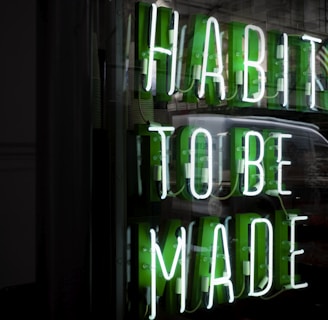7 Frugal Habits That Actually Feel Like Freedom (Not Deprivation)
Frugal living isn’t about being cheap—it’s about being intentional. Here are simple daily habits that make saving money second nature.


Here's what nobody tells you about being frugal—it's not about saying no to everything. It's about saying yes to the life you actually want instead of reacting to every sale notification and coffee craving that pops up.
I used to think frugal people were miserable. Sitting at home eating plain rice counting pennies while everyone else lived. Then I accidentally became one (being broke will do that) and realized something weird—these little daily habits didn't make me feel restricted. They made me feel free.
Free from constant money panic. Free from that sinking feeling opening credit card bills. Free to choose where money went instead of wondering where it disappeared every month.
These aren't extreme changes. You're not giving up your life. Just small tweaks that add up faster than you'd think. Like compound interest but for your sanity.
1. Start Your Day Without Spending Anything
My mornings used to cost $15 before I got to work. Coffee shop stop, maybe a breakfast sandwich, sometimes a muffin because why not it's already $8 what's $4 more right?
Now I make coffee at home. Takes 5 minutes. Costs like 50 cents. Tastes basically the same if I'm being honest.
Pack breakfast the night before. Usually yogurt and granola or banana with peanut butter. Nothing fancy. But it means I'm not buying a $7 burrito because I'm starving and it's right there.
While coffee brews I spend two minutes checking my budget app. Quick look—where am I this week? Weird charges? On track or do I need to calm down? This morning thing alone saves $75+ weekly. That's $300 monthly. A car payment or plane ticket or just room to breathe. From making coffee at home and eating food I already bought.
Boring maybe but it's the kind of boring that means I'm not stressed constantly. I'll take boring over anxious any day.
2. Get Weirdly Good at Making Copycat Drinks
I'm not saying never buy coffee out because that's unrealistic and also coffee shops are nice sometimes. But every day? That's $150+ monthly on drinks you could make yourself for basically nothing. Pinterest has every Starbucks copycat recipe ever. Iced brown sugar espresso? Made it for $1.50. Pumpkin cold brew? Easier than you think. That pink drink? Just coconut milk and strawberry stuff literally.
Bought cheap syrups on Amazon (vanilla, caramel, hazelnut) and they lasted forever. Got a $15 milk frother. Use instant espresso when I'm lazy. Not exactly the same but close enough I don't care.
Saving $30+ weekly on coffee means I can afford to actually go out for it when I want to sit somewhere nice and work or meet someone. Choice instead of daily habit I can't afford but do anyway.
Also, you feel accomplished making fancy drinks at home. Like look at me being a barista for 60 seconds of work.
3. Meal Planning Sucks But It Works
Resisted this forever because it sounded boring. Turns out it's what lets me stop thinking about food constantly and stressing every time I'm hungry.
Sunday or Monday I spend 20 minutes planning the week. Nothing crazy. "Monday pasta, Tuesday tacos, Wednesday chicken thing, Thursday leftovers, Friday whatever I'm tired probably."
Make a grocery list from that. Stick to the list at the store. This part's crucial—not on the list? Doesn't go in the cart unless actually necessary which it usually isn't.
Bulk buying saves stupid amounts if you'll use it. Rice, pasta, canned tomatoes, beans, frozen vegetables. Cheaper in big quantities and lasts basically forever.
Freeze everything too. Made too much? Freeze half. Meat on sale? Separate and freeze portions. Vegetables dying? Freeze for smoothies or soup.
Stops me ordering takeout because "nothing to eat" which was $200+ monthly. Now I know dinner plans and have ingredients. Revolutionary honestly.
4. Free Stuff Is Literally Everywhere
Entertainment doesn't have to cost money but we've been convinced it does. Streaming, theaters, concerts, restaurants, bars—hundreds monthly easy. Not saying never do paid stuff. Balance it with free things you're ignoring.
Library cards are free and libraries have way more than books now. Movies, audiobooks, ebooks, magazines, sometimes museum passes or equipment you can borrow. I check out movies instead of renting and saved $50+ just from that.
YouTube has literally everything free. Workouts, cooking, documentaries, language lessons, whatever. Cancelled my $40 gym membership for YouTube workouts at home. Same results, $480 saved yearly.
Parks are free. Walking's free. Hiking if you've got trails. I thought I needed to spend money to have fun on weekends but honestly my best days this year cost nothing. Just outside not thinking about money.
Your city probably has free events constantly—concerts, festivals, movie nights, art stuff. Check community boards or Facebook. Always something happening.
5. Clutter Makes You Buy More Somehow
Sounds fake but it's real. When my space is cluttered I spend more. Can't find what I have so I buy duplicates. Stressed from mess so I shop to feel better. Don't notice how much I own so buying more seems fine.
Now I declutter weekly. Sunday afternoon usually. Just 15 minutes on one area—bathroom counter, kitchen drawer, closet, whatever needs it.
Getting rid of unused stuff feels good. Space feels calmer. Realize how much I already have. Think twice before buying because do I want more stuff to deal with?
Less clutter means faster cleaning means I actually do it means space stays nice means I feel better means less stress-shopping. Whole cycle.
Plus selling decluttered stuff means money coming in instead of taking up space. Win-win whatever.
6. Reuse Everything Till It's Actually Dead
My grandma saved everything and I thought it was too much. Now I get it. Throwing away stuff that works is throwing away money basically. Glass jars become storage. Spaghetti sauce jars hold dry goods, leftovers, change, whatever. Free containers.
Old holey t-shirts become cleaning cloths. Cut them up, drawer full, use instead of paper towels. Haven't bought paper towels in six months. Leftover ingredients become new meals. Rotisserie chicken becomes tacos then soup then fried rice. Stale bread becomes croutons or breadcrumbs. Vegetable scraps freeze until I have enough for stock.
Not doing this to be noble about environment or whatever (though that's nice too). Doing it cause it saves money without feeling like sacrifice. Just smart about using what I paid for already. Something satisfying about making things work instead of buying new constantly. Makes you feel capable maybe.
7. Write Down Every Dollar You Spend
This habit changed everything. Every day write down what I spent. Not fancy. Quick notes in my phone.
$4 coffee. $12 lunch. $35 groceries. $8 Target stuff. That's it. 30 seconds. But seeing it written makes it real in a way swiping cards doesn't. Start noticing patterns you missed. Oh $60 at Target this week on stuff I can't remember. Buying lunch out four days weekly that's $200 monthly. Keep going to this store spending $40 every time.
Awareness is everything honestly. See where money goes then decide if that's where you want it. Usually not. Just habit.
Use Rocket Money for tracking cause it does some automatically but I write stuff manually too. Writing makes you think about it instead of letting it happen. Track for a month you'll find easy cuts that don't feel like cutting. Just stopping stuff you didn't realize you were doing.
Small Stuff Builds Big Freedom
None of this is dramatic. Not moving into a tiny house or eating beans every meal or giving up enjoyment.
Just making coffee home most days. Planning meals so you're not ordering constantly. Using what you have instead of buying more. Paying attention where money goes. Small boring things add up to hundreds monthly. Thousands yearly. Difference between constant money stress and feeling like you can handle whatever comes.
Not deprivation. Freedom. From money anxiety. To make choices instead of reacting. To save for things mattering instead of wondering where everything went. Start with one habit this week. One. Maybe morning coffee or tracking spending. See how it feels. Add another next week maybe.
Small choices build big results. Give it a month see where you're at. Might surprise yourself honestly.









